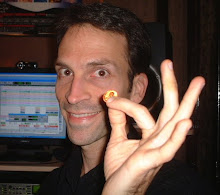In my previous blog post, I explained my philosophy of "it's not what you earn, it's what you save". In the future, I'll go into greater detail about the many advantages of focusing on expenses rather than income, but for today, I thought I'd start by offering some practical, specific cost-cutting tips. Here are a number of examples of ways to keep your costs down without undue suffering:
It's the Little Things that Matter
- My favorite example: most people in Southern California (and many other urban areas) don't drink straight tap water. You can opt for spring water home delivery or purchase bottled water at the supermarket, at a cost of between 50¢ and $2/gallon. Or you can bring your own bottles to a drinking water vending machine and pay 20¢/gallon. Tap-mounted filters are another good money saving option. If you drink four gallons per week, this will save you $62 to $374 per year, and you're still drinking the same amount of quality water!
- I mentioned it last week, and I'll say it again. Excessive eating and drinking out can break your budget quickly. Instead, bring along a healthy snack or your own water bottle, and the savings can easily add up to $50-$100 a month.
- Use a site like www.gasbuddy.com to find out where the cheapest gas stations are in your area, then make a habit of stopping to fill up every time you pass one of those stations, even if your tank is still half full. If you drive 12,000 miles/year and get 25 miles per gallon, paying 10 cents less per gallon would save you about $50 per year, without having to cut back your mileage.
- If you take your car to a full-service carwash once a week, you might pay $7 to $15. Go to a do-it-yourself coin-operated carwash and get it done for $4, or better yet, wash it with your garden hose at virtually no cost. You'll get some good exercise out of it, and save $150-$780 annually!
- Try shopping online. You can find everything from CDs to clothing online nowadays, and usually at the best possible price, if you do a thorough search and compare deals. You'll save gas and time by not driving from one retail store to the next. Yes, you will usually have to pay shipping costs, but this is often offset by tax savings and lower prices from online retailers.
Don't Forget the Big Ticket Items
- Consider buying a good, low mileage used car instead of a new car at the dealer. You can save thousands of dollars in depreciation, while still getting almost the same useful life from the vehicle. Of course, it goes without saying that compact cars are usually more economical, in terms of both gas costs and insurance/maintenance. Do you really need a big truck to move your musical gear? If so, then exactly how big does it need to be?
- Shop around for a good deal on rent. Right now, as people are bailing out of homeownership in droves, rents are generally going up. But there are always good deals to be had on rent, for those willing to do a thorough search. It's worth the trouble, because once you find a deal, you can ride it out for years, saving many thousands of dollars over time.
- Reexamine your insurance coverage. This is a very personal issue, and everybody's situation is different. But you might be surprised at how much money you can save by getting comparison quotes from different insurance companies. Considering a higher deductible (for those with a comfortable emergency fund stashed away - subject of a future blog) is another way to lower costs. Compared to many of my friends, I am saving hundreds of dollars every year on car insurance alone.
Saving hundreds or thousands of dollars on a single transaction feels good, but remember that saving $100 per year on a dozen smaller expenses (like drinking water) would still add up to $1200 in your pocket at the end of the year. Who couldn't use 1200 bucks?






2 comments:
Why on Earth would you recommend renting versus home ownership? Purchasing my home was the best thing I ever did. You just have to be smart about it. The only people "bailing" are those with ARMs. My 30-yr. fixed is looking pretty attractive right about now ;)
Clarification: I'm not saying "don't buy a house". The buy/rent decision is a very complex calculation (possible subject of a future blog entry). I'm just saying that renters should seek out the best deal possible. I'm glad the home purchase worked out for you, Nick!
Post a Comment